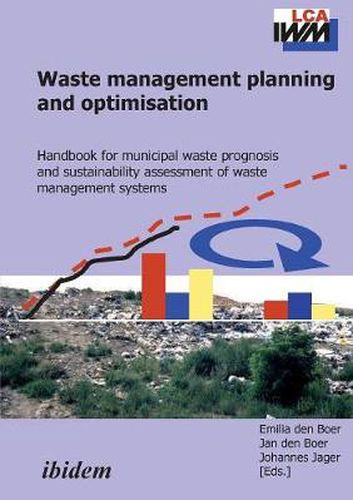Readings Newsletter
Become a Readings Member to make your shopping experience even easier.
Sign in or sign up for free!
You’re not far away from qualifying for FREE standard shipping within Australia
You’ve qualified for FREE standard shipping within Australia
The cart is loading…






This title is printed to order. This book may have been self-published. If so, we cannot guarantee the quality of the content. In the main most books will have gone through the editing process however some may not. We therefore suggest that you be aware of this before ordering this book. If in doubt check either the author or publisher’s details as we are unable to accept any returns unless they are faulty. Please contact us if you have any questions.
This book is the result of three intensive years of investigation performed by partners from 9 European countries, including consulting companies, university institutes and municipalities within the project The Use of Life Cycle Assessment Tools for the Development of Integrated Waste Management Strategies for Cities and Regions with Rapid Growing Economies (LCA-IWM). The project was funded by the European Commission’s Fifth Framework Programme. Each chapter deals in depth with a different aspect of municipal waste management systems. A method for the prognosis of waste generation is described. The reader is also provided with a clear understanding and significant criteria for the evaluation in terms of sustainability of the waste management situation. The book not only answers the question how we are , but also provides the reader with key tools to the more important point how can we improve it . One of the most important contributions of the project is the creation of two user adjustable computer assisted tool which support the accurate making of decisions in the waste management field, where rapid developing municipalities find it difficult to successfully plan their systems in order to fulfill the growing requirements of the European regulations. This Handbook also provides guidelines for the use of the developed Waste Prognostic Tool and the Municipal Solid Waste Management System Assessment Tool.
$9.00 standard shipping within Australia
FREE standard shipping within Australia for orders over $100.00
Express & International shipping calculated at checkout
This title is printed to order. This book may have been self-published. If so, we cannot guarantee the quality of the content. In the main most books will have gone through the editing process however some may not. We therefore suggest that you be aware of this before ordering this book. If in doubt check either the author or publisher’s details as we are unable to accept any returns unless they are faulty. Please contact us if you have any questions.
This book is the result of three intensive years of investigation performed by partners from 9 European countries, including consulting companies, university institutes and municipalities within the project The Use of Life Cycle Assessment Tools for the Development of Integrated Waste Management Strategies for Cities and Regions with Rapid Growing Economies (LCA-IWM). The project was funded by the European Commission’s Fifth Framework Programme. Each chapter deals in depth with a different aspect of municipal waste management systems. A method for the prognosis of waste generation is described. The reader is also provided with a clear understanding and significant criteria for the evaluation in terms of sustainability of the waste management situation. The book not only answers the question how we are , but also provides the reader with key tools to the more important point how can we improve it . One of the most important contributions of the project is the creation of two user adjustable computer assisted tool which support the accurate making of decisions in the waste management field, where rapid developing municipalities find it difficult to successfully plan their systems in order to fulfill the growing requirements of the European regulations. This Handbook also provides guidelines for the use of the developed Waste Prognostic Tool and the Municipal Solid Waste Management System Assessment Tool.